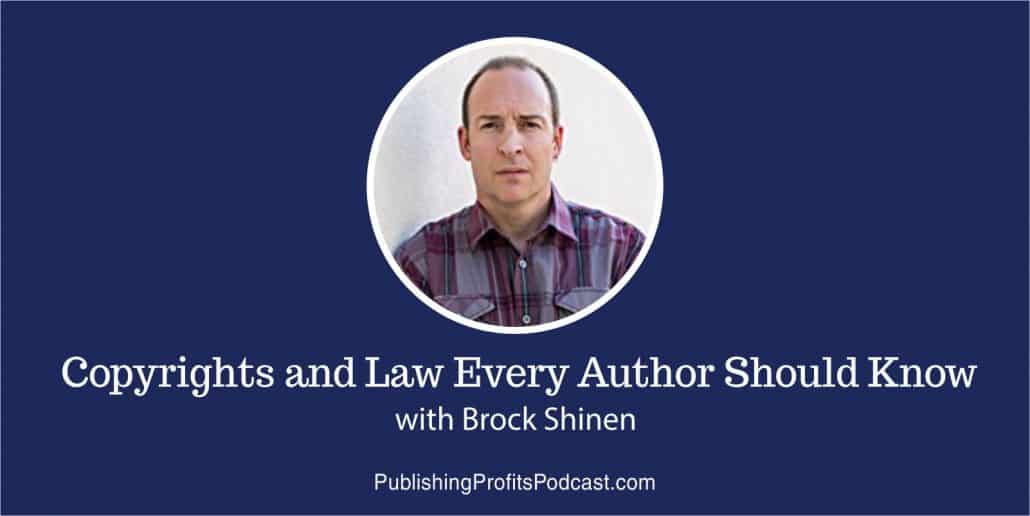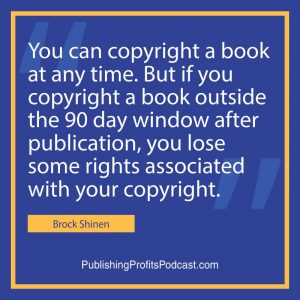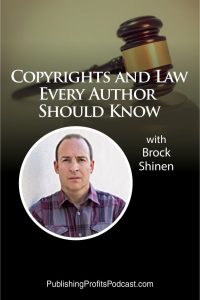Podcast: Play in new window | Download
Subscribe: Apple Podcasts | RSS
 Brock Shinen launched his law practice in 2003 and specializes in Intellectual Property, Entertainment and Business. He’s one of the few lawyers who’s also an entrepreneur and author, so he has first-hand experience dealing with the same legal questions you and I have.
Brock was working in the music industry when he became interested in the issues surrounding intellectual property and copyright. That’s when he decided to go to law school. On the writing side of things, Brock has been writing since 1992. He’s written just about everything you can from short stories, to songs, to fiction, nonfiction as well as articles.
His office handles all kinds of clients. He has worked with New York Times best-selling authors and first-time authors anxious to make their mark.
During our conversation we talked about a number of issues including why you should register your copyright, when it’s appropriate to trademark your title, and when you should consider forming an LLC as an author.
Here are some of the takeaways:
Brock Shinen launched his law practice in 2003 and specializes in Intellectual Property, Entertainment and Business. He’s one of the few lawyers who’s also an entrepreneur and author, so he has first-hand experience dealing with the same legal questions you and I have.
Brock was working in the music industry when he became interested in the issues surrounding intellectual property and copyright. That’s when he decided to go to law school. On the writing side of things, Brock has been writing since 1992. He’s written just about everything you can from short stories, to songs, to fiction, nonfiction as well as articles.
His office handles all kinds of clients. He has worked with New York Times best-selling authors and first-time authors anxious to make their mark.
During our conversation we talked about a number of issues including why you should register your copyright, when it’s appropriate to trademark your title, and when you should consider forming an LLC as an author.
Here are some of the takeaways:
- Under US copyright law when you fix something in a tangible form of expression, like a written book the work is protected. The issue authors have is that they can’t do anything with that protection unless they’ve filed a registration with the US copyright office. So for example, if you’ve noticed that someone has violated your copyright, you can’t sue them unless you have a registration claim on file with the US copyright office.
- It’s best to register your copyright within 90 days of publishing your book.
- You can copyright a book at any time. But if you copyright a book outside the 90 day window after publication, you lose some rights associated with your copyright.
- The Poor Man’s Copyright (that is mailing your manuscript to yourself as a form of protection) is a myth. The courts have ruled that mailing your manuscript to yourself gives you no protection. For one thing, it’s easy to unseal and reseal an envelope.
- Hiring a lawyer to register your copyright can be expensive for indie authors. But the government’s filing fee for a copyright is around $55 in most cases, and Brock has a course to teach you how to do it yourself.
- Registering your copyright yourself can take anywhere from one hour to two hours.
- After you register your copyright at the copyright office it can take anywhere from 3 to 12 months to receive confirmation that your work is copyrighted.
- The most important thing to remember when you register your copyright is to doublecheck and make sure you’ve submitted everything correctly because if you forget to submit something, you may not know for months that your application was incomplete.
- Trademark Law grants protection where you’ve used some sort of indicator to identify the source of your goods and services.
- Trademark law is more complicated than copyright law and you really need to get a lawyer to file a trademark application for you because there will be another lawyer reviewing your trademark application.
- You can trademark your book title if you are building your brand around that title.
- Under trademark law there are several different classifications of good and you’re required to pay fees for every classification of good that you want to protect yourself in making.
- The cost of setting up an LLC ranges from about $1000 to about $3000. But there are a lot of benefits.
- It’s important to be informed about your rights and responsibilities under the law.
- Don’t assume you have to fight when you get a demand or cease and desist letter.. In disputes the first step is often a posture.
- It’s important to consult an attorney so that you know your rights when you’re threatened.
- Don’t settle any claim before talking to an attorney.
- Don’t ever give personal information just because you get a demand letter. You are not required to give people information just because they ask for it.

The Benefits of Incorporating As a Self Published Author
1. Setting up a Limited Liability Corporation (LLC) can protect your personal assets if you’re sued for copyright infringement. 2. There are also several tax benefits to having an LLC. 3. If you’re doing business out in the marketplace, say with a distributor, they are much more likely to work with you if you are an LLC. You’re taken more seriously.Links and Resources Mentioned in the Interview
Brock’s course on copywriting — a Udemy course where Brock teaches you everything you need to know to register your own copyright. US copyright office — this is where you register your copyright. US copyright office FAQs — here’s a lot of good information about registering your copyright. Copyright office fee schedule — a table showing what fees need to be paid to register a copyright. Shinenlaw.com — Brock’s law practice BrockShinen.com — Brock’s personal website cogneypop podcast — How entrepreneurs should think about problems Like this post? Click on the image below and share this on your favorite Social Media Platform (like Pinterest!).
Tom Corson-Knowles is the founder of TCK Publishing, and the bestselling author of 27 books including Secrets of the Six-Figure author. He is also the host of the Publishing Profits Podcast show where we interview successful authors and publishing industry experts to share their tips for creating a successful writing career.

Edward, this obviously doesn’t constitute legal advice, but here is some information to help you in your research: Registration (or filing for a registration, depending on your jurisdiction), is a prerequisite to filing a lawsuit: http://1.usa.gov/1T6oHJv. The 90-day window (actually, it’s 3-month language, not 90 days) impacts the remedies available to you (http://1.usa.gov/1WjCQUz). I hope that helps! Let me know if you have any other questions: [email protected].
You state that you can’t act on your copyright unless it is registered. Could you point me to a resource, either case law or actual statute where this is stated, because I’ve never heard it elsewhere. What are some of the protections that you won’t receive if you take longer than 90 days from the creation date to file for copyright registration?